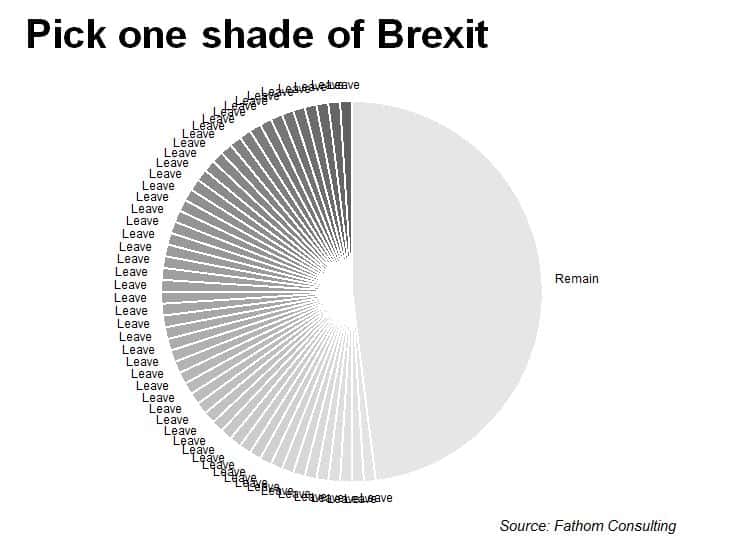A sideways look at economics
There’s a law in logic, called the law of the excluded middle, that states, with reference to the proposition ‘a’: not (a and not a). That is to say, something is either the case or is not the case, never both. There’s no ‘middle’.
Aside from wishing I could exclude a bit more of my middle, I would observe that real life isn’t that simple. We use equivocal phrases like:
“Well, it is and it isn’t…”
“Yes and no…”
“On the other hand…”
Or more recently and topically, paradoxical phrases like:
“We can have our cake and eat it.”
And then there are tautological phrases like:
“Brexit means Brexit.”
Even propositions that in a logical sense are perfect circles, such as Theresa May’s famous quote, can – in the real world – have shades of meaning, which are discussed endlessly among political commentators.
The real world is mostly neither black nor white but in-between, in the space that’s excluded from formal logic – shades of grey. And never more so than when it comes to Brexit. You’d have to be a sadist to want to inflict further discussion of Brexit on others, and you’d have to be a masochist to enjoy it. So here goes.
UK voters have expressed a preference for ‘not a’, that is to say, Brexit: that the UK should not be part of the European Union. Arrow’s impossibility theorem (see earlier TFiF – ‘Authoritarianism on the march in Fathom, and elsewhere?’) states that there’s no voting system that reliably translates the preferences of the people into policy, even in circumstances where that’s the sole aim of the body politic and each of its members. Further, the aims of politicians may well be more complicated than that, as the principal/agent problem illustrates.
Right now, delivering ‘not a’ is proving to be exceptionally difficult, for both of those reasons. First, while ‘a’ is clearly defined, ‘not a’ encompasses a spectrum of potential outcomes, shaded from pale to dark grey.

Voters haven’t expressed a preference across that ‘not-a’ spectrum. Were they asked to do so, the question would be extremely complex and the expressed preferences could be incoherent and could conflict in some respects with the result of the initial referendum. And second, individuals in the elected government have interests and preferences that don’t align perfectly with those of the voting public and, specifically, with the wishes expressed in the referendum.
There’s one strand of economics that can perhaps help: the theory of the second best (Lipsey and Lancaster [1]). If there’s an unavoidable imperfection which leads to a sub-optimal outcome for the economy as a whole, there will be some circumstances in which it’s better to leave other, avoidable imperfections in place, as they offset, to some degree, the unavoidable one.
In this context, the unavoidable ‘imperfection’ can be thought of as the fact that voters haven’t expressed preferences across the spectrum of ‘not-a’ outcomes. There’s nothing to be done about that, as Arrow has demonstrated.
There’s no way to have certainty about the wishes of the electorate when it comes to ‘not-a’, Brexit. Even a second referendum on whatever the deal eventually is wouldn’t resolve this issue, since the full-spectrum question would not be asked – a second referendum would probably involve a question like: looking at the Brexit deal, would you prefer to take that deal or to remain in the EU on existing terms? But what about the other options, like pushing for a different deal, or pushing for change in the terms of our relationship with the EU? There’s no perfect solution to this problem.
So, what’s to be done?
In these circumstances, it may be better to allow another imperfection to persist than it would be to correct it. The other imperfection is that the preferences of elected officials, our agents, may not be aligned with those of the voters, the principal.
Our agents, the politicians, have to choose one of the shades of grey on our behalf. That’s what representative democracy means. We can’t, by voting, tell them what we want in that space: we’ve elected them to choose for us. Any choice is better than no choice. Of course, it matters what the choice is – it matters a great deal. But the worst outcome of all, thanks to the uncertainty it engenders, is a suspension of any decision until there’s clarity on what kind of Brexit the British public wants. There will never be perfect clarity.
Had the referendum returned a ‘Remain’ vote, then (and only then) the implication for our political agents would have been relatively clear (though still unsatisfactory since, even then, the full-spectrum question hadn’t been asked and could have delivered a different result). But it didn’t. So, we’re in a second-best world, because there’s an unavoidable problem, namely that the electorate haven’t declared which version of ‘not-a’ they prefer. Instead of fruitlessly seeking to remove the unavoidable problem – by divining what the ‘not-a’ wishes of the electorate are – it would be better for our political agents to go with their biases, whatever they are, and reach a decision. Find a middle. Choose a shade of grey.
Make a choice: that’s what you’re paid for.
1. R. G. Lipsey and Kelvin Lancaster, ‘The General Theory of Second Best’, The Review of Economic Studies, 24/1, 1 January 1956.